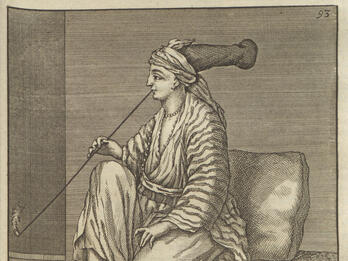Faradji Chouat
The rabbi and prolific poet Faradji Chouat was born in Fez and later settled in Béja, Tunisia. A renowned scholar and kabbalist, he acquired a reputation as a saintly, pious, and charitable figure, and many legends were told about him. According to one, he asked that after his death his body be placed on an ass and buried wherever the animal came to a stop. Thus, he was buried in Testour, and his grave became a site of pilgrimage for North African Jews and was believed to heal the sick. Chouat’s Hebrew liturgical poetry, which was influenced by Hebrew poets such as Israel Najara, was popular among the Jews of Tunisia and North Africa; many of his works are still sung today by descendants of these communities. In almost all his works, the themes of exile and redemption are especially prominent. Even poems written for individuals and to mark life-cycle events interweave these themes. His poems were intended for use in the synagogue or at festive meals; Chouat indicated the melody to which they were to be sung.


